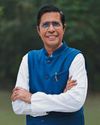
At present there is a visible distinction in the economic status and growth performance between the six southern states, viz., Kerala, Goa, Tamil Nadu, Karnataka, Andhra Pradesh and Telangana on the one hand and the six north-central and eastern states—Uttar Pradesh, Madhya Pradesh, Bihar, Jharkhand, Chhattisgarh and West Bengal—on the other. According to offcial statistics, the per capita income in Goa is nearly 10 times that of Bihar. The average per capita income of the six peninsular states in 2021–22 was Rs 1.50 lakh in constant 2011–12 prices. The average of the six eastern states for the same year works out to be only Rs 56,000, or a third of their southern counterparts. The divide becomes even more marked when the seven north-eastern states are included. The differences in per capita income cogitate the lack of opportunities in these states; this is also reflected in the migration pattern of the population which is induced by the low livelihood earning opportunities. As per the last census, around 40% of the Indian migrants are from these six eastern states.
Similarly, most human development indicators, provided by the fifth National Family Health Survey show these to be at a significantly lower level in the eastern states when compared to those in the six peninsular states. This holds true for indicators like longevity, literacy, child malnutrition, women suffering from anaemia, etc. This results in a sharp distinction between the two sets of states in terms of the sustainable development goals (SDGs). Nearly all the six peninsular states have an SDG score in the 70s, with Kerala topping the list with a score of 75. On the other hand, the six eastern states, on an aggregate, manage a score in the 50s, nearly 20 points lower than the southern states.
This story is from the February 2024 edition of Outlook Business.
Start your 7-day Magzter GOLD free trial to access thousands of curated premium stories, and 9,000+ magazines and newspapers.
Already a subscriber ? Sign In
This story is from the February 2024 edition of Outlook Business.
Start your 7-day Magzter GOLD free trial to access thousands of curated premium stories, and 9,000+ magazines and newspapers.
Already a subscriber? Sign In

From Chandni Chowk to Global Recognition
For Manish Aggarwal, director at Bikano, Bikanervala Foods, the family business was not just a responsibility but a passion he took to the global stage

Spotting AI Scams
Al has become an integral part of our lives, from customer service no insurance claims. But it is also becoming a tool for fraudsters who use it to scam individuals and corporations

Let a Hundred Flowers Bloom
On the banks of the Ganges in industrial Kanpur, a start-up has blossomed that turns waste flowers into incense

BATTERY LOW
India produces enough green energy to power many of its largest cities yet lacks the storage to use it efficiently. A nation blazing forward must leap ahead in battery technology to stay on course

We Have Everything Going for Rajasthan
Rajyavardhan Singh Rathore, Rajasthan’s industry and commerce minister, tells Pushpita Dey why the state is suited to become a hub for investments.

Dairy and Other Dilemmas
India’s refusal to open its dairy market has complicated trade negotiations for years. As global partners demand concessions, is the cost of protectionism outweighing benefits?

Riding in a Maze
As gig workers ride into an uncertain future with little more than a smartphone and a bike, the government is struggling to arrange a socialsafety net. But millions without social security is recipe for disaster

BIRLA'S BIGGEST BATTLE
As Kumar Mangalam Birla completes 30 years at the helm of the Aditya Birla Group, he has a battle to defend his businesses and conquer new ones

THE INNOVATION LEAP
India dreams of becoming a product nation. But unless the corporate sector significantly increases spending on R&D, the country will continue to lag behind global peers

EDUCATION BUDGET MUST DOUBLE EVERY 3 YEARS
Veezhinathan Kamakoti, a renowned academic and director of Indian Institute of Technology Madras, tells Deepsekhar Choudhury on what technology sovereignty means for India and how it can propel the country towards its vision of becoming a developed nation by 2047.